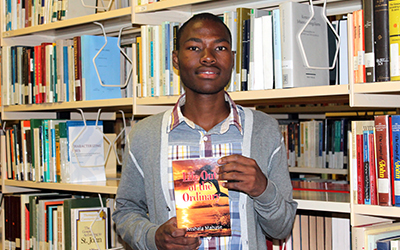
Ntshala Mahasa: The young storyteller
Three years ago Ntshala Mahase was an ordinary high school learner studying texts prescribed by the Department of Education. Now, other learners will be reading his brainchild, Life out of the Ordinary.
The third-year LLB student at the University of the Free State (UFS) officially launched his debut novel in July 2015 at the Bloemfontein Campus. Three months later, the work of fiction has reached a milestone of note. The novel has been selected as one of 12 books from young and emerging writers to form part of the Library and Information Association of South Africa’s (LIASA) Young Writers Programme.
LIASA is the regulatory body for South African public, school, and university libraries. Ntshala’s literary contribution is to be distributed to different school libraries, as per decision of the Western Cape and Gauteng Departments of Education.
About the book
The book narrates the transformational journey of a privileged suburban school boy who one day coincidently exposes himself to the harsh realities of an impoverished South African community. Tom then decides to make a difference and assist those who are less privileged. His experience out of his ordinary and secured Hyde Park life shakes him to such an extent that he falls into emotional anxiety and depression.
One in a thousand
Out of more than 200 entries, Life out of the Ordinary emerged as the only entry from outside the borders of the two provinces to make a set of 1 000 books recommended by LIASA to be prescribed by public schools as of 2016.
Ntshala was taken aback by the enthusiastic reception which his story attracted. “I am greatly humbled.This means it will rub shoulders with books by great South African authors like Niq Mhlongo, Zukiswa Wanner, Thando Mgqolozana, Zakes Mda and the likes,” he said. He is currently authoring his second novel.